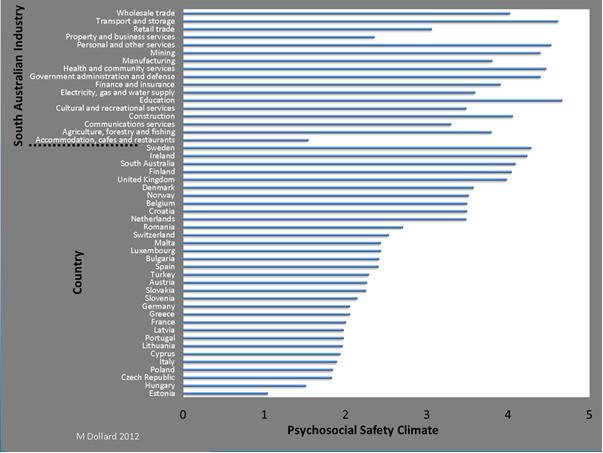07 September 2012
 Workers in South Australia may have some of the best psychological health conditions in the world according to new research conducted at the University of South Australia’s Centre for Applied Psychological Research.
Workers in South Australia may have some of the best psychological health conditions in the world according to new research conducted at the University of South Australia’s Centre for Applied Psychological Research.
Researchers compared results from recent telephone interviews with 661 SA employees with data from over 28,000 OHS managers from 31 different European countries.
Participants were asked whether their organisation had a procedure to deal with work-related stress, bullying or harassment and work-related violence; whether employees were consulted regarding measures to deal with psychosocial risks; and whether employees were encouraged to participate actively in the implementation and evaluation of the measures.
Overall results show that South Australia ranked third just behind Sweden and Ireland.
Drilling down to the industry level, industries such as transport and storage, mining and education appear particularly well protected in SA.
Leading the Australian Research Council funded Australian Workplace Barometer project, Professor Maureen Dollard also considered several points of bias.
“We have to consider the possibility that European OHS managers report conditions more favourably because positive results may be indicative of their performance,” Prof Dollard said.
“And overall the SA data may reflect a ‘healthy worker effect’ where those psychologically injured have already left the workforce.
“Alternatively one might argue that employees would report a much dimmer picture than managers which would have pushed SA down the ladder.”
Prof Dollard said that although the results seemed promising regarding South Australian industry efforts to reduce psychological injury at work, many industries were performing below the State standard and there were some worrying results.
“In SA employees in the accommodation, cafes and restaurant industries reported a lack of psychosocial protections and compared to the national European data, these industries ranked in the bottom three per cent which put those SA workers in environments similar to those reported in Hungary and Estonia,” she said.
“Along with property and business services and retail trade, none of which scored particularly well, these SA industries need urgent intervention to improve psychosocial safety climate to protect employees against psychological injury at work.”
She said organisations need to be alert to industry trends but also endeavour to systematically monitor psychosocial risk factors within their own organisations to ensure the broad positive outcomes for South Australian workers are not diminished.
“Workers value work environments where they are protected from the impacts of psychosocial risk and report higher levels of engagement,” Prof Dollard said.
“We should not underestimate how important factors like these are to productivity and to enhancing the attractiveness of working in South Australia.”

Michèle Nardelli office: 08 8302 0966 mobile: 0418 823 673 email: michele.nardelli@unisa.edu.au




